Jul 31, 2017
Expat engagement with politics in Japan, expectations of the right to vote
It can probably go without saying that there have been some pretty seismic political decisions made over the last couple of years and that none of them have come out of Japan (unless we can count the recent resignation of Japan defence minister Tomomi Inada is earth shattering). So it’s likely then that many an expat in this country has been watching the big political action unfurl from afar.
On a personal level this geographical separation has sprung mixed feelings; when it was my country’s turn to be in the spotlight of global politics people in the office who had, up to that point, barely given me a second glance fell about me like I had all the answers to the chaos. I’d never been so popular. Popularity came with a strange feeling of separation, guilt almost, that I should have been over there somehow affecting things. Offering my opinion on WhatsApp based political discourse with friends back home made feel even more of a charlatan. Still, with the rough comes the smooth - political commentators telling the youth of my country of birth that they would be better off “getting out while they can”, left me to thing “Well, I’m already out thanks, so what to engage with now?”.
Good question! On what level can we (expats) engage with politics in Japan? One would immediately be tempted to answer something along the lines of, “Only among ourselves!”. I mean, have you ever tried to engage with the locals on any meaningful political discourse? In this expat’s experience it tends to be a bit of a non-starter, although that could be just me.
The right of suffrage among expats in Japan has long be topic of stunted debate. As things stand, we can’t vote unless we become nationalised / take Japanese citizenship (although I’ve heard that it might be possible in some local elections, in a vaguely “unofficial” capacity). Turning Japanese though, means giving up our original nationality (and the passport that comes with it) - a hurdle which may, understandably, be too high for many (both practically and mentally / spiritually). "Dual nationality" isn’t an option on these shores.
"Stunted" because we’re not sure we want it / deserve it (the right of suffrage) anyway, and because few people with the power the enact such a change appear to not be listening or not to be giving it much thought.
But thus far, most of the above is based on personal experience, so let’s turn it over to other expats in Japan. We asked you/ the City-Cost users for their views on engaging in Japanese politics …
1) As a foreign resident of Japan, how well represented do you feel by Japan's politicians on a national level?
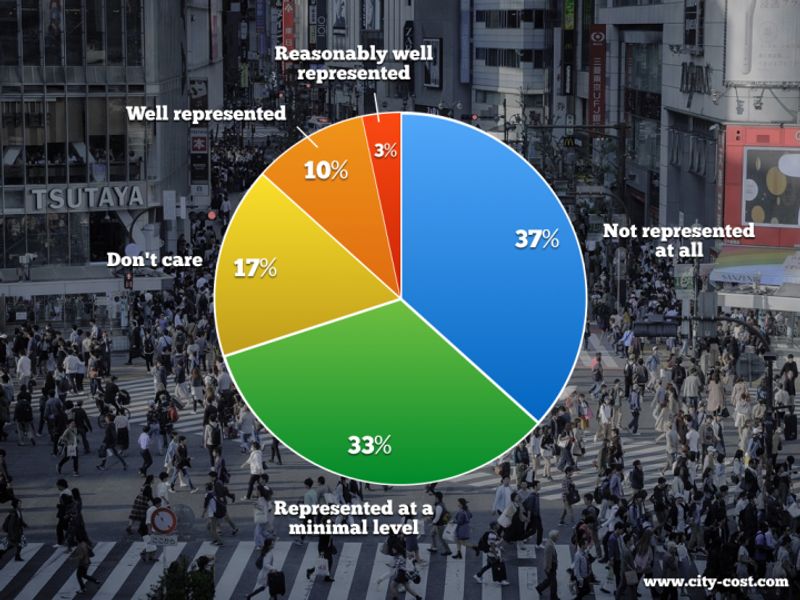
The obvious thing to question here is how different this chart might look (or not) if it was reflecting the opinions of locals. You never know, perhaps they feel the same way? Anyway, it probably comes as little surprise to see feelings of being represented well significantly in the minority.
2) As a foreign resident of Japan, how well represented do you feel by your local government / authorities?
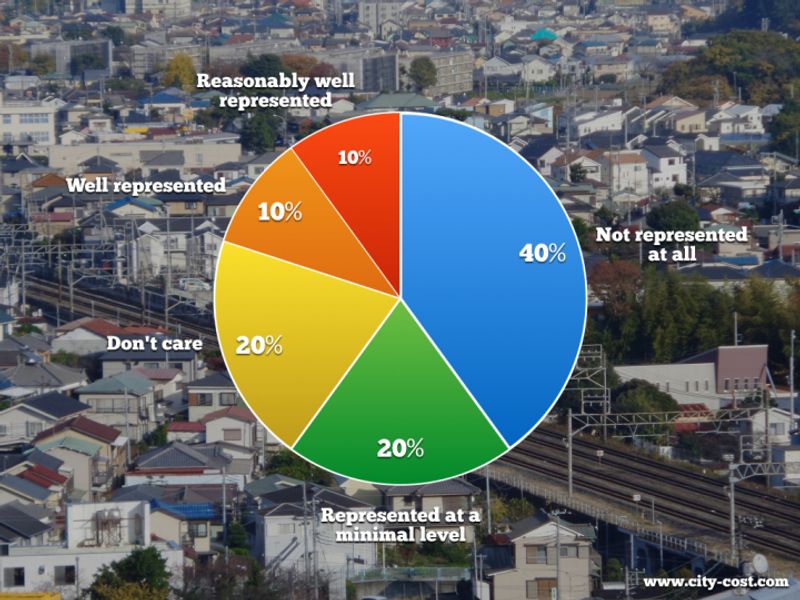
A slight increase in the lack of interest in local politics might raise a bit of a chuckle - this kind of political environment has never been the most ... glamorous, has it? Still, given the blunt reality of expats in Japan having to pay city tax / residential tax (as in, in most cases we have to actually go and physically pay it) and the, perhaps, truism that if the first step towards political representation for expats in Japan is going to come from anywhere, it is likely be at a local level, then this lack of interest might come as a surprise.
Overall though, feelings of representation (or lack thereof) remain similar to that at a national level.
3) On a scale of 1 to 10, how engaged do you think you are with politics in Japan and the way in which the country is run?
We asked you to assess your level of engagement with politics in Japan on a scale of 1 to 10, 1 being totally unengaged. 60% of us scaled at 3 or less. 13% at 8 and above. Maybe "engaged" here isn't the best choice of word as it seems to be a little vague. After all, one could make the case that being engaged with politics doesn't have to have anything to do with voting. On the other hand, how meaningful can any engagement be if it has no potential to affect change? Of course, if we really wanted to get bogged down in this we could easily find those who hold the opinion that voting affects little meaningful change anyway so any "engagement" is somewhat delusory.
4) How often do you purposefully check for news regarding politics in Japan?
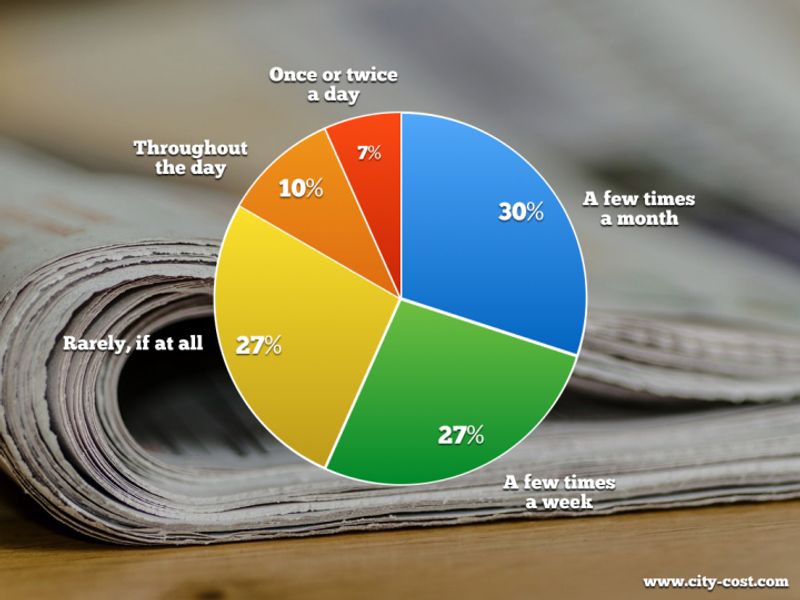
Going under the, perhaps bold, assumption that this chart would look quite different had the question been about politics in our nations of birth, the results here might be said to reflect one of two things (or a combination of both); 1) That there is a lack of understanding on our part of political structures, procedures, personalities (the term used loosely) and culture in Japan. 2) That there is a feeling of disconnect with politics in Japan rendering news from that sphere as rather dull.
5) As a foreign resident of Japan, if you were eligible to vote in elections (national or local) in Japan, would you?
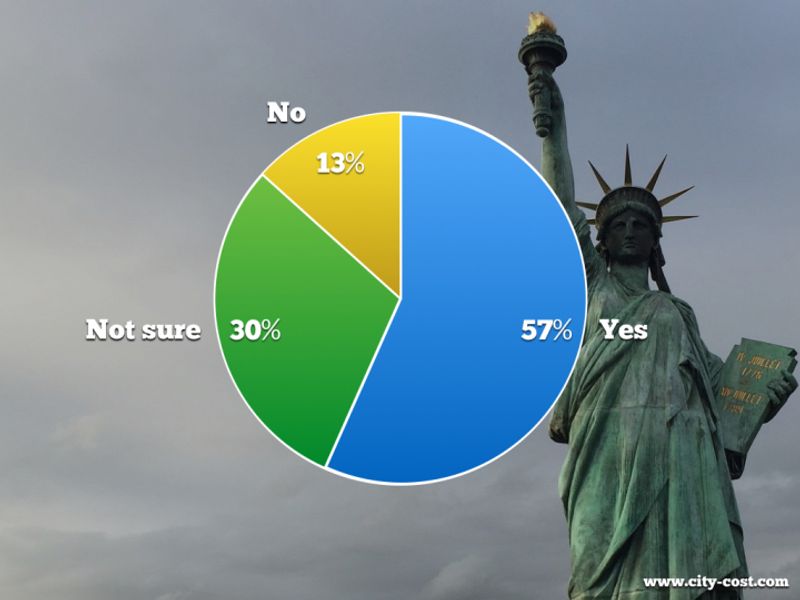
A fairly resounding, "Yes!" then (at least when compared to percentages that pop up in the political sphere). It would be interesting to know how many of us hail from "democracies" where the right to vote is often seen as both duty and privilege (or how many of us hail from those counties where fines are dished out to those that give it a miss). Coming from such a political background a "Yes" would surely seem like the natural response.
Still, a combined 43% of uncertainty and definitive negation makes this a close run contest (although it's not a contest) and an interesting one at that. Opinion here largely seems to be divided into those who would rather stay away from the responsibility, those who view their status as temporary thus making it slightly unjust that they should have (or rather should offer) their say in matters that really affect others apart from themselves, and those who feel their lack of understanding of Japanese politics renders them unsuitable for the vote.
7) As a foreign resident of Japan, do you feel that you should have the right to vote in elections (local or national) in Japan?
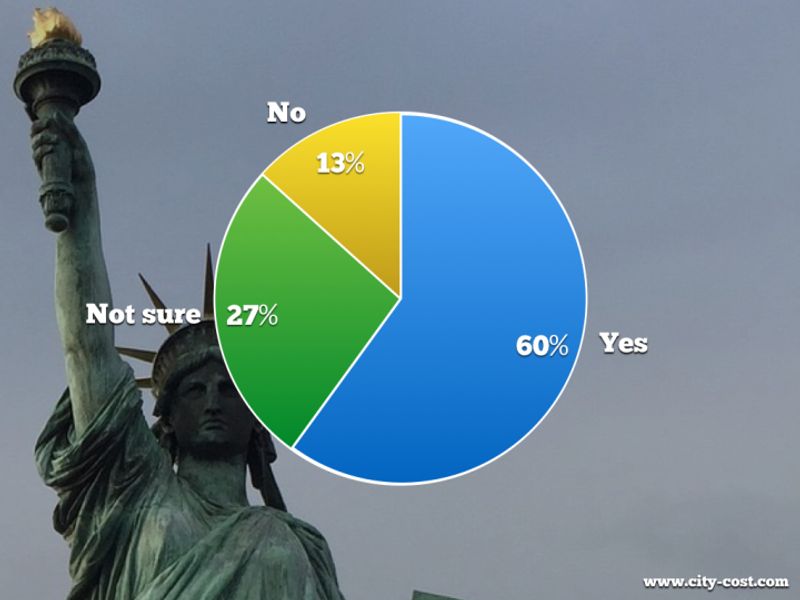
And so we get to the crux of the matter. Should expats in Japan have the right to vote? Well, in practical terms we do, if we stop being expats and become "Japanese" - a matter of years and paperwork. In technical terms however, we don't, at least not according Japanese constitutional law.
A lot of us seem to be wrestling with the idea that at some point foreign residents of Japan should be afforded the chance to vote in elections but we're not sure when that time should come i.e. how long we need to have been resident in Japan.
In some cases we see a more clear-cut thought approach - we live and work here, pay taxes, and are subject to (largely) the same policies made by Japan's politicians as everyone else. Therefor we should be able to vote. This thought process seems to become clearer / stronger where family is also involved.
9) The Government of Japan has an official English-language webpage. How often do you visit it?
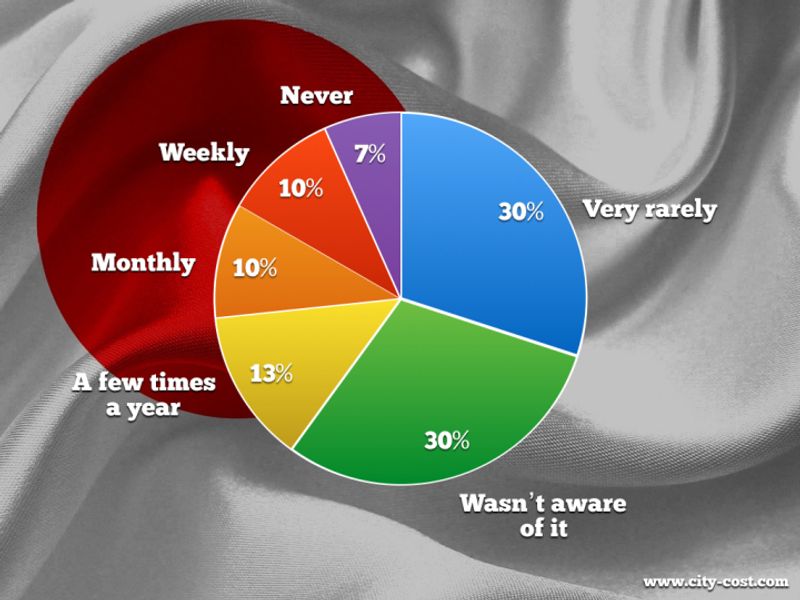
It used to be the case that a public figure, organization, even product barely existed without a website. These days we probably should have asked the same question but switched "website" with "Twitter account".
Anyway, the government of Japan does have a website (in English) which you can see here. Interestingly, within the website can be found issues of the "official" magazine, "We Are Tomodachi", full of jauntily positive terms like "boost", "free trade", "advances", and "relationships". Sadly however, a status as "tomodachi" (friends) isn't enough to get us the vote. In fact, perhaps the word choice was more careful than we might initially have given it credit for. Friends, after all, tend to come and go. Had they used something like "family", then we might have been on to something.
Moving forward then, do you feel like you should be more engaged with politics in Japan? How does being in Japan affect your level of engagement with politics back home? Let us know in the comments.
See us on ...
Twitter: @City_Cost_Japan
Facebook: @citycostjapan



0 Comments